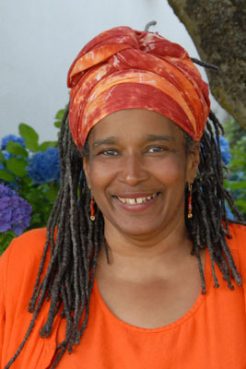
(RNS5-MAR12) The Rev. Ann Holmes Redding is an Episcopal priest who expects to be defrocked because she is also a follower of Islam. While dual-faith adherents like her are rare, experts say the number of people who borrow elements from various faiths is on the rise. For use with RNS-TWO-FAITHS, transmitted March 12, 2009. Religion News Service photo courtesy Church Publishing.
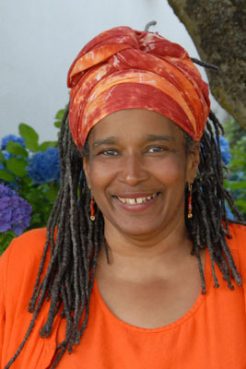
(RNS5-MAR12) The Rev. Ann Holmes Redding is an Episcopal priest who expects to be defrocked because she is also a follower of Islam. While dual-faith adherents like her are rare, experts say the number of people who borrow elements from various faiths is on the rise. For use with RNS-TWO-FAITHS, transmitted March 12, 2009. Religion News Service photo courtesy Church Publishing.
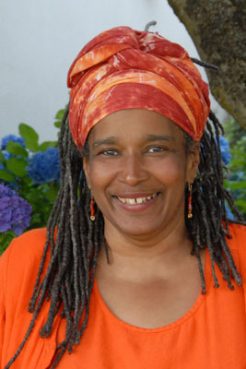
(RNS5-MAR12) The Rev. Ann Holmes Redding is an Episcopal priest who expects to be defrocked because she is also a follower of Islam. While dual-faith adherents like her are rare, experts say the number of people who borrow elements from various faiths is on the rise. For use with RNS-TWO-FAITHS, transmitted March 12, 2009. Religion News Service photo courtesy Church Publishing.
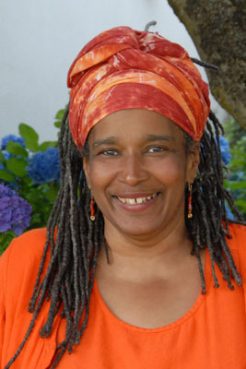
(RNS5-MAR12) The Rev. Ann Holmes Redding is an Episcopal priest who expects to be defrocked because she is also a follower of Islam. While dual-faith adherents like her are rare, experts say the number of people who borrow elements from various faiths is on the rise. For use with RNS-TWO-FAITHS, transmitted March 12, 2009. Religion News Service photo courtesy Church Publishing.
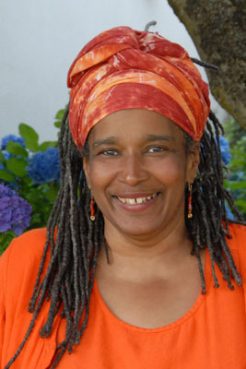
(RNS5-MAR12) The Rev. Ann Holmes Redding is an Episcopal priest who expects to be defrocked because she is also a follower of Islam. While dual-faith adherents like her are rare, experts say the number of people who borrow elements from various faiths is on the rise. For use with RNS-TWO-FAITHS, transmitted March 12, 2009. Religion News Service photo courtesy Church Publishing.
(UNDATED) Friday afternoons find the Rev. Ann Holmes Redding at the Al-Islam Center in Seattle, reciting Muslim prayers.
Come Sunday, she heads about two miles south to kneel in the pews of St. Clement’s of Rome Episcopal Church.
“My experience and my call is to continue to follow Jesus,” said Redding, an Episcopal priest for the past 25 years, “even as I practice Islam.”
Redding says she is both Christian and Muslim, fully following both faiths. And for that, Redding expects to be defrocked soon by the Episcopal Church, which has warned the 57-year-old to renounce Islam or leave the priesthood.
Some Episcopalians are urging the church to take a similar stand against the Rev. Kevin Thew Forrester, who was elected bishop of the sparsely populated Diocese of Northern Michigan last month. The only candidate on the ballot, Thew Forrester, 51, has practiced Zen meditation for a decade and received lay ordination from a Buddhist community.
Conservatives are outraged at the election of this “openly Buddhist bishop,” as they call him, charging Thew Forrester with syncretism — blending two faiths, and dishonoring both.
The bishop-elect and the Lake Superior Zendo that ordained him say the angst is misplaced. The ordination simply honors his commitment to Zen meditation, they say. He took no Buddhist vows and professed no beliefs that contradict Christianity.
“I am not a Buddhist, nor an ordained Buddhist priest,” Thew Forrester said in a interview. “I am an Episcopal priest who is grateful for the practice of Zen meditation.”
While people like Redding, who claim membership in two religions, are quite rare, scholars say the number of Americans who borrow bits from various traditions is multiplying.
Current sociological surveys, with their one-size-fits-all categories, don’t tell us exactly how many Americans hybridize their spiritual lives. Sociologist Barry Kosmin, co-author of the recent, massive American Religious Identification Survey, said “the tendency of academics and everyone else is to try to disabuse them of this syncretism.”
For sure, “syncretism” is a dirty word to many Western monotheists (in Asia, “multiple religious belonging,” as scholars call it, is common). The Rev. Kendall Harmon, an Episcopal theologian from South Carolina, argues that Thew Forrester is a greater threat to his church than the openly gay bishop whose 2003 election has led four dioceses to secede.
“It’s the leadership of this church giving up the unique claims of Christianity,” Harmon said. “They act like it’s Baskin-Robbins. You just choose a different flavor and everyone gets in the store.”
The store, in this metaphor, is that big ice-cream parlor in the sky.
But modern America is becoming a spiritual supermarket, teeming with everything from astrology to Zoroastrianism and propelling profound changes to religious beliefs and practices.
Less than three in 10 Americans claim their religion is “the one, true faith leading to eternal life,” according to data from the Pew Forum on Religion & Public Life, and 44 percent say they’ve switched religious affiliations since childhood.
At the same time, traditional religious boundaries are falling and interfaith marriages are rising, meaning Americans are increasingly likely to attend a grandmother’s church funeral and a cousin’s bar mitzvah.
It’s little surprise then, that people who pledge allegiance to two traditions — your JewBus, Sufi Christians and Quaker pagans — are proliferating.
John Berthrong, a Boston University scholar whose book, “The Divine Deli,” explores multiple religious belonging, said: “While churches are still having formal discussions about religious pluralism, the laity has bolted down the street to a Buddhist temple where they’re learning meditation.”
Sometimes those temples house Jesuit priests or Catholic nuns like Sister Rose Mary Dougherty, who leads a multi-faith group of Zen students in Silver Spring, Md.
A nun for 50 years, Dougherty is also a sensei in the White Plum Lineage of Zen Buddhism, meaning she is entrusted to teach meditation to others.
Like many Christians who practice Zen, she uses its meditation techniques to clear the mind and focus on the present moment, but sets aside most philosophical questions. And she doesn’t consider herself a Buddhist.
“To be truthful, we don’t often examine doctrine or religious beliefs,” Dougherty said of her Zen community. “We talk about the practice of meditation in our daily lives.”
For decades, Catholics like the late monk Thomas Merton have sung the praises of Buddhism, and a number of Catholic sisters, priests, and brothers lead Zen communities. They’ve been aided by the ascendance in the West of a particular branch of Zen that focuses on meditation and downplays ritual and philosophy, said Jeff Wilson, an expert on Buddhism and an assistant professor at Renison College, University of Waterloo in Canada.
But at a recent conference in Boston on multiple religious belonging, theologian Catherine Cornille argued that it’s logically impossible to adhere to more than one religious tradition.
“It just doesn’t make sense to say you’re fully Buddhist and fully Christian — they make completing claims,” said Cornille, a professor at Boston College and editor of “Many Mansions? Multiple Religious Belonging and Christian Identity.”
The same might be said of Christianity and Islam. While Muslims revere Jesus as a prophet, they deny his divinity and redemptive power, the cornerstone of Christianity.
Redding, the Muslim Episcopalian, said her two faiths “illumine each other much more than they collide” and that she “doesn’t feel called to spend a lot of time in theological disputes.”
But the God of the Bible calls himself a “jealous God” whose first commandment is “thou shalt have no other gods before me.” And some Christians accuse Redding of two-timing the Almighty.
“They say, `I think you’re being unfaithful, it’s as if you have two bedfellows,”‘ Redding said. She prefers to think of it as having two children who sometimes fight, but both of whom she loves.
The Episcopal Church says Redding must make a choice by March 31 or she will lose her cleric’s collar. “It will be a moment of heartbreak,” she said, “but it’s not the end of the story.”
(OPTIONAL TRIM FOLLOWS)
Thew Forrester, meanwhile, is trying to avoid a similar fate. Conservative Episcopalians have launched a campaign to block his consecration as a bishop, which has even made news in London, the birthplace of Anglicanism. What is he thinking about when he meditates, they ask. Buddha? Karma?
The hubbub is unnecessary, Thew Forrester says. In his daily meditation, he doesn’t think about Buddhism, or Zen philosophy. In fact, he tries not to think about anything.
“My practice is simply sitting in the presence of God,” Thew Forrester said. “When thoughts arise I let them go and return to being in the presence of God.”




